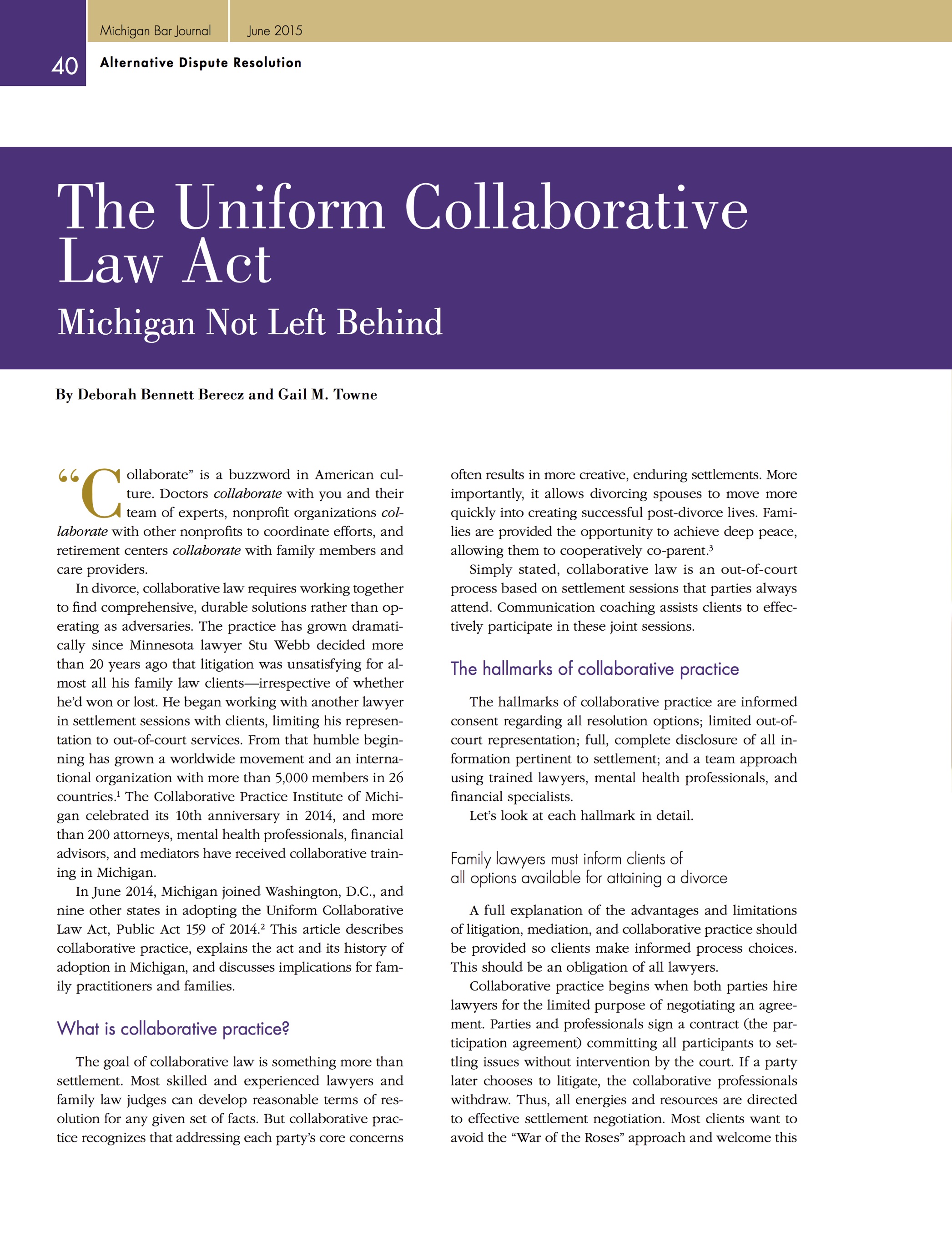Complex problems require a team. Divorce is complex. We are all susceptible to overestimating our abilities–and underestimating the abilities of others. Think about whether you want any solution just to be done or one that is thoughtful, workable and will endure over time. Then put together the right team to help you achieve those goals.
For me, it took a team.
I woke up with an ear infection the day before I was scheduled to board a plane for Idaho last week. Ear infections and flying are not a good combo. I rushed to get ready in time to be at my doctor’s office when they opened, hoping they could work me in that morning. The receptionist knows me and her usual warm welcome was in operation. She said they’d get me right in. My doctor placed her otoscope in my ear and said, “you have something lodged in your ear.” Wait, what? She retrieved a torture device and set about to extract the offending visitor. It hurt. I gritted my teeth, and yelped a couple times, but told her to do what she had to do. It wouldn’t budge. She was flummoxed and told me she’d be right back because she wanted to consult with her colleague. While I waited, I called my audiologist. When my doctor and her colleague came back to the room, talking about a couple approaches, I put my audiologist on speaker and held still while the three of them talked and probed and discussed possible solutions. Soon the nurse appeared and implemented the fix.
On the plane I reflected on my experience with these 5 professionals. It took a team to figure out and solve this perplexing, painful problem. It occurrs to me that parallels exist for our clients and our work as family law professionals.
1. It was my problem and I was clearly part of the team.
It was my ear that hurt so I acknowledged a problem existed: Step 1. But fortunately, since it turned out my self-diagnosis was wrong, I knew enough to get professional advice: Step 2. And in the thick of figuring out the solution, with two physicians talking it through, I pulled in another expert, my audiologist.
Our clients know their pain points best. Dividing property may be fairly straight-forward but they know developing a parenting time plan (“PTP”) will be excruciating. Others may not have kids, or the parents are completely aligned in the plan that will work for their children, but property consists of multiple parcels of real estate or businesses–and income disparity is huge. In our firm, we believe we can’t do anything meaningful until we listen to our clients. In an initial consultation, our clients will hear some version of,“What keeps you up at night when you think about a divorce?” We recently met with a potential client and asked that question. He seemed so unsure that his marriage was over, and reported that his wife felt that same way. We suggested that he didn’t need a divorce lawyer right now but rather a marriage counselor. Maybe they’d move more confidently into divorce; but maybe they’d work things out. It’s worth being sure. If we had just launched into lengthy explanations of how we calculate child support and deal with family businesses, we would have failed at understanding that particular client’s fundamental need. So never lose sight of the fact that while you may not fully understand the law or the judges, you know you. You know your kids and your spouse. In our firm, you are a full-on member of your divorce team.
2. You know the problem–or think you do.
I sure did. It never occurred to me that a foreign object could have found its way into my ear. I was confident I had an infection. You’ve heard of the Dunning-Kruger effect? It’s the psychological bias that causes people to fail to recognize their own incompetence. We all know people who overestimate their ability on a given task. I apparently forgot that I went to law school and not medical school.
We meet with clients regularly in our firm who have agreed that property can be divided this way or that in what seemed to be a logical approach. But when we analyze the financial impact, it sometimes turns out that one spouse would receive 75% or more of the marital property. That’s rarely the intention. We’ve also talked to people who, under the guise of “I’ll always be honest with my children” have disclosed to their child that the other parent had an affair. I don’t know any therapist who would agree that this is a good idea. Others have settled on support and agreed that a certain percentage of their income will be paid to the other. But when we run the state support guidelines, their percentage is drastically different from what a court would require.
As important as remembering that you know you, it’s equally important to recognize that you might not be spot on in identifying the actual problem. You probably didn’t take Divorce 101 in college! Despite the wealth of information available out there, until a careful evaluation of how the law will intersect with you and your family’s needs, you might misdiagnose the problem and apply the wrong cure. In other words, you might take an antibiotic when you don’t have an infection. Which leads to the next parallel.
3. Build Your Team.
I had such respect for my doctor that she didn’t have to be the one physician on the planet who knew everything about everything. She wasn’t totally certain how to proceed and was confident enough in her own skills and expertise to pull in another physician on the case. Both those physicians were quite open to talking with my audiologist. Together, they found the right solution. And they weren’t the only team members. The always-warm and gracious medical receptionist talked to me, got the paperwork flowing, and put me on the schedule. Once my team of doctors decided on a solution, it was the nurse who actually implemented it. If we had lost any one member of this team we never would have gotten to the best solution.
If you are remodeling a room in your home, it probably isn’t wise to grab a sledge hammer and start tearing down walls. Rather you might need to consult with an architect, hire a general contractor who consults with and hires subcontractors. And you might consult with interior designers along the way. A team helps ensure that your house doesn’t come tumbling down because you tore out a support beam. We have a lovely office now but it had to be built-out and I really had no idea what I was getting into. But with a contractor who educated me, dry-wallers, electricians, painters, plumbers and an amazing designer, years later we are still always happy to come into our office in the mornings!
I am grateful for the warm and gracious people our clients first meet when they call or come into that office. It’s built into our Statement of Values that we always want our clients to experience a “soft landing” when they engage with our firm. We are only able to deliver that because of the people our clients first meet–the exceptional people who answer your calls and greet you at the door. We may be biased but we think we’ve nailed that one!
The lawyers in our firm have been at this for awhile. And yet we regularly confer with one another as we deliver on another of our firm’s core values: to provide exceptionally skilled legal services and advice. Lawyers aren’t business valuation experts but we know CPAs who are and work with them when needed. In our collaborative work, not only are both collaboratively-trained lawyers on a case charged with generating creative solutions and solving problems, we do that with the assistance of a divorce coach (the mental health professional who shepherds the discussion along and deals with the emotional divorce issues that are always at work). In some cases a financial specialist is part of the team. My experience is that King Solomon had it right when he said that “two are better than one.” We develop more thoughtful, durable settlement terms when we collaborate with a team to develop solutions. We encourage people to avoid the cowboys–those attorneys, contractors, physicians or other professionals who know everything (and who too often forget that the client is the most important member of the team).
4. Be able to competently discuss different perspectives.
A study published in the journal Science determined that “…two heads may be better than one, but only when we can competently discuss our different perspectives.” https://www.scientificamerican.com/article/are-two-heads-better-than
I was impressed with the dialogue all three of the medical professionals engaged in over my ear mystery. No arrogance or superiority.
 They were just all in on getting to the bottom of it and finding a solution. But first, I described for them the pain. Similarly, you have to be able to outline for your architect what you want out of a home remodel. You will need to articulate your needs and concerns to your spouse, to your lawyer or perhaps to a judge. If this isn’t your best skill, bone up. Talk to a divorce coach. There are good books such as Difficult Conversations, Getting to Yes, Getting Past No, and Beyond Reason that can prepare you for these discussions.
They were just all in on getting to the bottom of it and finding a solution. But first, I described for them the pain. Similarly, you have to be able to outline for your architect what you want out of a home remodel. You will need to articulate your needs and concerns to your spouse, to your lawyer or perhaps to a judge. If this isn’t your best skill, bone up. Talk to a divorce coach. There are good books such as Difficult Conversations, Getting to Yes, Getting Past No, and Beyond Reason that can prepare you for these discussions.
If you’d like a free copy of Difficult Conversations, email us for details at [email protected].
How did my emergency turn out? The nurse flushed water into my ear while holding a basin underneath my head to catch the water flow. Soon the illegal alien, a tiny piece of plastic, flowed right out of my ear and into the basin–no pain involved. Problem solved. Thanks to a great team.
Wishing you wisdom,
Deb, Gabi and all your team at B&A











